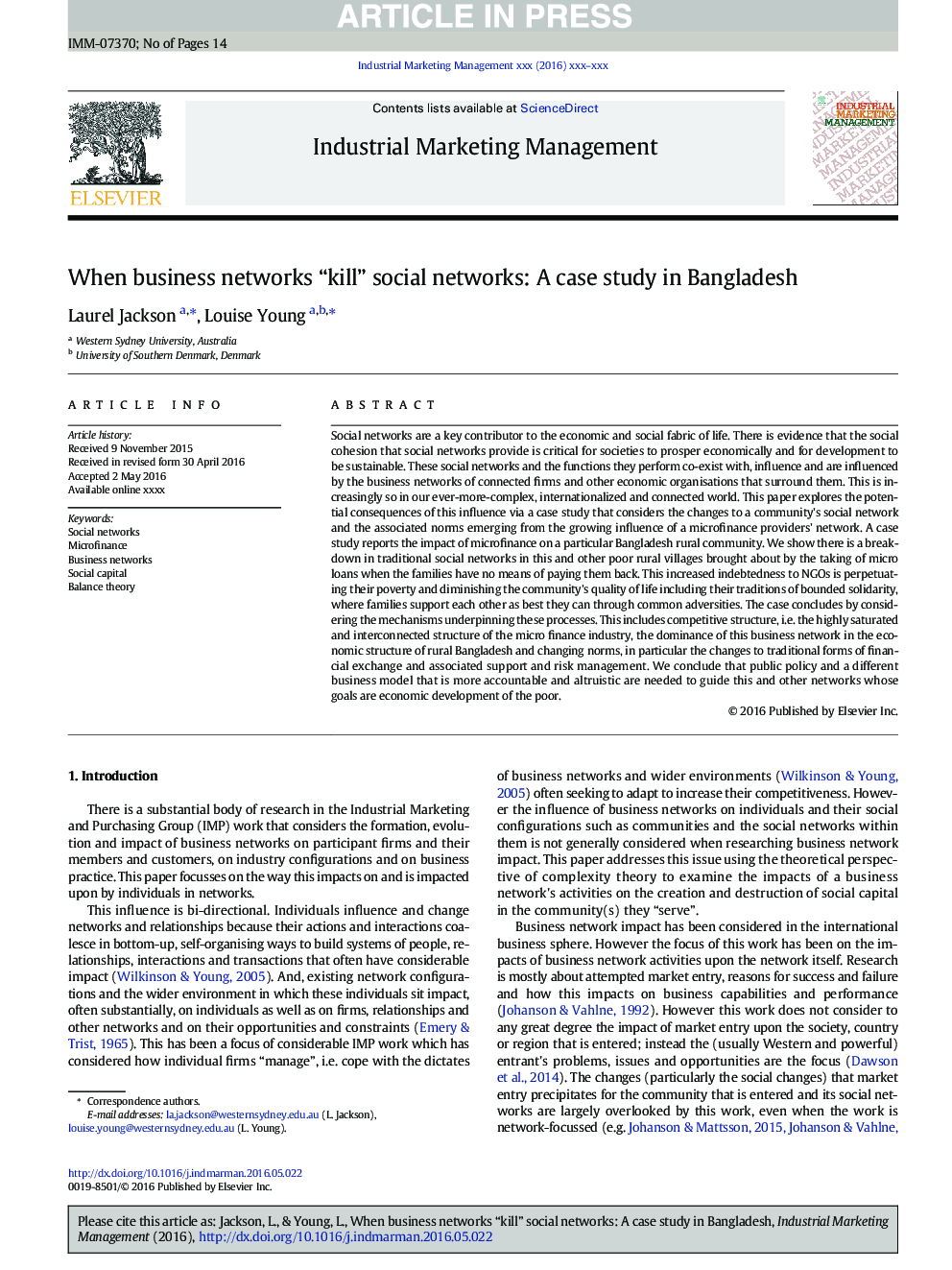| کد مقاله | کد نشریه | سال انتشار | مقاله انگلیسی | نسخه تمام متن |
|---|---|---|---|---|
| 7432279 | 1483444 | 2016 | 14 صفحه PDF | دانلود رایگان |
عنوان انگلیسی مقاله ISI
When business networks “kill” social networks: A case study in Bangladesh
ترجمه فارسی عنوان
هنگامی که شبکه های کسب و کار یک کیلو ؟؟ شبکه های اجتماعی: مطالعه موردی در بنگلادش
دانلود مقاله + سفارش ترجمه
دانلود مقاله ISI انگلیسی
رایگان برای ایرانیان
کلمات کلیدی
شبکه های اجتماعی، قرضه کوچک شبکه های کسب و کار، سرمایه اجتماعی، نظریه تعادل،
ترجمه چکیده
شبکه های اجتماعی یکی از مهمترین نقش ها در ساختار اقتصادی و اجتماعی زندگی است. شواهدی وجود دارد که انسجام اجتماعی که شبکه های اجتماعی ارائه می دهند، برای جوامع به لحاظ اقتصادی رضایت بخش و برای توسعه پایدار است. این شبکه های اجتماعی و کارکردهای که آنها انجام می دهند همکاری می کنند، تحت تاثیر قرار می گیرند و تحت تاثیر شبکه های تجاری شرکت های متصل و دیگر سازمان های اقتصادی که آنها را محاصره می کنند. این به طور فزاینده ای در جهان ما همیشه پیچیده تر، بین المللی و متصل است. این مقاله به بررسی عواقب بالقوه این تاثیر از طریق یک مطالعه موردی می پردازد که تغییرات در شبکه اجتماعی جامعه و هنجارهای مرتبط با تأثیر رو به رشد شبکه های ارائه دهندگان مؤسسات مالی را در نظر می گیرد. یک مطالعه موردی، تاثیر تأمین مالی خرد در یک جامعه روستایی بنگلادش را گزارش می دهد. ما نشان می دهیم که در شبکه های اجتماعی سنتی در این و دیگر دهکده های روستایی فقیر ناشی از دریافت وام های کوچک به وجود آمده است که خانواده ها هیچ راهی برای پرداختن به آنها ندارند. این افزایش بدهی به سازمان های غیردولتی، فقر و کاهش کیفیت زندگی جامعه را از جمله سنت های همبستگی محدود خود، که در آن خانواده ها از یکدیگر حمایت می کنند، به عنوان بهترین آنها ممکن است از طریق نگرانی های مشترک، ادامه دهند. این مورد با در نظر گرفتن مکانیزم هایی که بر پایه این فرایندها است، نتیجه گیری می شود. این شامل ساختار رقابتی است، یعنی ساختار بسیار اشباع شده و مرتبط با صنعت مالی خرد، تسلط این شبکه تجاری در ساختار اقتصادی بنگلادش روستا و تغییر هنجارها، به ویژه تغییرات در فرم های سنتی مبادله مالی و حمایت و ریسک مدیریت. ما نتیجه می گیریم که سیاست های عمومی و مدل کسب وکار متفاوت دیگری که برای حسابرسی این و دیگر شبکه ها که اهداف آنها توسعه اقتصادی فقرا است، مورد نیاز است که پاسخگو تر و غیرقابل اعتماد است.
موضوعات مرتبط
علوم انسانی و اجتماعی
مدیریت، کسب و کار و حسابداری
بازاریابی و مدیریت بازار
چکیده انگلیسی
Social networks are a key contributor to the economic and social fabric of life. There is evidence that the social cohesion that social networks provide is critical for societies to prosper economically and for development to be sustainable. These social networks and the functions they perform co-exist with, influence and are influenced by the business networks of connected firms and other economic organisations that surround them. This is increasingly so in our ever-more-complex, internationalized and connected world. This paper explores the potential consequences of this influence via a case study that considers the changes to a community's social network and the associated norms emerging from the growing influence of a microfinance providers' network. A case study reports the impact of microfinance on a particular Bangladesh rural community. We show there is a breakdown in traditional social networks in this and other poor rural villages brought about by the taking of micro loans when the families have no means of paying them back. This increased indebtedness to NGOs is perpetuating their poverty and diminishing the community's quality of life including their traditions of bounded solidarity, where families support each other as best they can through common adversities. The case concludes by considering the mechanisms underpinning these processes. This includes competitive structure, i.e. the highly saturated and interconnected structure of the micro finance industry, the dominance of this business network in the economic structure of rural Bangladesh and changing norms, in particular the changes to traditional forms of financial exchange and associated support and risk management. We conclude that public policy and a different business model that is more accountable and altruistic are needed to guide this and other networks whose goals are economic development of the poor.
ناشر
Database: Elsevier - ScienceDirect (ساینس دایرکت)
Journal: Industrial Marketing Management - Volume 58, October 2016, Pages 148-161
Journal: Industrial Marketing Management - Volume 58, October 2016, Pages 148-161
نویسندگان
Laurel Jackson, Louise Young,
